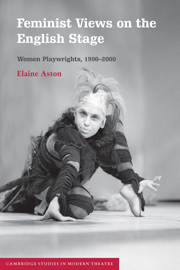Book contents
- Frontmatter
- Contents
- Acknowledgements
- 1 A feminist view on the 1990s
- 2 Telling feminist tales: Caryl Churchill
- 3 Saying no to Daddy: child sexual abuse, the ‘big hysteria’
- 4 Girl power, the new feminism?
- 5 Sarah Kane: the ‘bad girl of our stage’?
- 6 Performing identities
- 7 Feminist connections to a multicultural ‘scene’
- 8 Feminism past, and future? Timberlake Wertenbaker
- 9 Tales for the twenty-first century: final reflections
- Notes
- Bibliography
- Index
8 - Feminism past, and future? Timberlake Wertenbaker
Published online by Cambridge University Press: 22 September 2009
- Frontmatter
- Contents
- Acknowledgements
- 1 A feminist view on the 1990s
- 2 Telling feminist tales: Caryl Churchill
- 3 Saying no to Daddy: child sexual abuse, the ‘big hysteria’
- 4 Girl power, the new feminism?
- 5 Sarah Kane: the ‘bad girl of our stage’?
- 6 Performing identities
- 7 Feminist connections to a multicultural ‘scene’
- 8 Feminism past, and future? Timberlake Wertenbaker
- 9 Tales for the twenty-first century: final reflections
- Notes
- Bibliography
- Index
Summary
In this chapter, I return to two key areas of debate: the relevance of feminism to women's lives at the close of the twentieth century and the ‘crisis in masculinity’ that I outlined in Chapter 1. To generate general discussion on both of these points, I specifically turn to another established and high profile playwright of the contemporary English stage: Timberlake Wertenbaker.
Like Caryl Churchill, Timberlake Wertenbaker has had a long and productive career on English and international stages. Also like Churchill, Wertenbaker benefited in her early writing years from support from a women's company, and from a sustained relationship in the 1980s with the Royal Court and its director Max Stafford-Clark. The 1990s, however, were more difficult for Wertenbaker. Along with other playwrights in this volume, she felt marginalised by the ‘rush of plays by male dramatists’. ‘I don't think women have ever been a welcome voice’, she explained, ‘You sense a relief that we can shut those women up and get back to what really matters, which is what men are saying. … We talk about women dramatists, but it's significant that “woman” becomes the compound whereas “male” is the noun’. Moreover, while the Royal Court was her ‘home’ in the 1980s, in the 1990s Wertenbaker found herself ‘homeless’: partly due to Stafford-Clark's departure in 1993 to go freelance and partly due to her resignation from the Royal Court Board, over the Court's drive towards private sponsorship which Wertenbaker saw as detrimental to new writing.
- Type
- Chapter
- Information
- Feminist Views on the English StageWomen Playwrights, 1990–2000, pp. 149 - 168Publisher: Cambridge University PressPrint publication year: 2003



